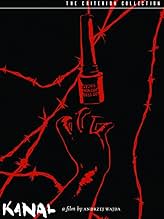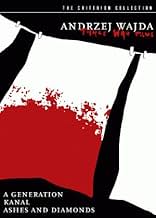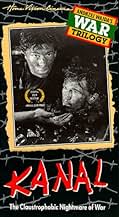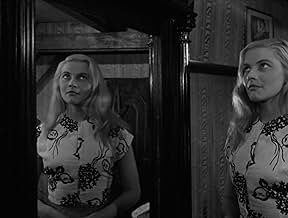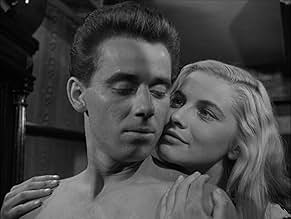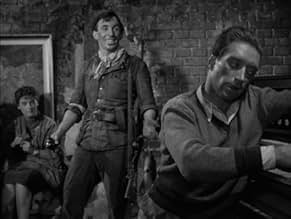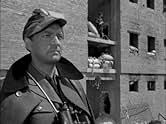NOTE IMDb
7,9/10
8,5 k
MA NOTE
En 1944, lors du soulèvement de Varsovie contre les nazis, le lieutenant polonais Zadra et ses combattants de la résistance utilisent les égouts de Varsovie pour échapper à l'encerclement al... Tout lireEn 1944, lors du soulèvement de Varsovie contre les nazis, le lieutenant polonais Zadra et ses combattants de la résistance utilisent les égouts de Varsovie pour échapper à l'encerclement allemand.En 1944, lors du soulèvement de Varsovie contre les nazis, le lieutenant polonais Zadra et ses combattants de la résistance utilisent les égouts de Varsovie pour échapper à l'encerclement allemand.
- Réalisation
- Scénario
- Casting principal
- Nomination aux 1 BAFTA Award
- 1 victoire et 2 nominations au total
Vladek Sheybal
- Composer Michal
- (as Wladyslaw Sheybal)
Wlodzimierz Bednarski
- Insurgent
- (non crédité)
Zenon Dadajewski
- Insurgent
- (non crédité)
Avis à la une
Watching Andrzei Wajda's war movie 'Kanal' one is stuck just by how short the interval was between the making of this film and the horrors it depicts. And while there were plenty of British and American war films made in the 1950s, it was perhaps easier to turn "our" story into the black-and-white banality of heroic fable, besides which, "we" could also make movies without communist censors looking over our shoulders. Wajda here chooses to fashion a tale centred on the collapse of the Polish resistance to the Nazis: the last survivors take to the sewers, the Germans pump gas down, and you know as soon as the film starts that there will be no happy endings, even for the survivors. It's a tale whose laconic nihilism would be remarkable in any era: I was reminded of the (much later) BBC nuclear-themed drama 'Threads', another tale of underground life facing extinction, while the dialogue, stoical in the face of impossible fate, offers more direct echos, for it made me think of the films of another Polish master, Krystoff Kieslowski. The most remarkable things in this film are the poetically bleak sequence of scenes that end it; it's biggest failing is the score, that (as with many films of this era) feels the need to describe the plot, and not merely to complement it. Occasionally other aspects of the movie also give away its age, but what's much more notable is the modernity (and hopelessness) of its approach to its material. A fine achievement, dating from an era when the events it portrayed were the present, not the past.
10tutusaad
I saw this film in a film festival in Dhaka, in early sixties(Now Bangladesh, then East Pakistan). For me as a student, Sattayjit Ray's Apu trilogy was my only exposer to any kind of art film then. Visual realism was a new thing for us in Indian sub continent. Audience were so spellbound that they could smell sewage sitting in the cinema hall. I think like all great directors, Wajda had the cinematographic sense to create that environment where viewers reality could blend with creative fiction. In post war period of late forties and in early fifties like the School of Polish Posters, all creative mediums went through this fatalistic phase. It was grotesque but realistic.
This is certainly NOT a feel-good film, as it deals with the horrors of the Nazis and their crushing of the Warsaw uprising of 1944. After all, there is no way or reason to make this a nice or fun movie to view. It just isn't possible. BUT, we are treated to an intensely realistic and viscerally disturbing film showing the war in all its awfulness. The first portion of the film is set in crumbling buildings and the nobility of the cause is apparent. However, the vast majority of the film is set in the sewers (hence the title "Kanal") and the characters, over time, lose some of their nobility and just ache to survive. The film is intensely claustrophobic and the filth they move about in literally looks like raw sewage--so as the characters fight for life and, in most cases, give up hope, you find yourself being pulled into their world and their terror. A great, though intensely awful film to watch. So, it comes as no surprise that I would not recommend this film to children or people afflicted with claustrophobia.
PS--if the musician seems familiar, it's because Wladyslaw Sheybal (also known as "Vladek Sheybal") is one of the Bond Villains in the movie FROM Russia WITH LOVE.
PS--if the musician seems familiar, it's because Wladyslaw Sheybal (also known as "Vladek Sheybal") is one of the Bond Villains in the movie FROM Russia WITH LOVE.
"Kanal" (Polish, 1957): This is the second of Andrzej Wajda's trilogy about WWII in Poland. I love the photography the light, the angles, the flowing camera movements. "Kanal" is about a group of resistance fighters and civilians who, out of necessity, band together to fight (what appears to be a losing battle) against the oncoming Nazis. First set in an incredibly bleak ruin of Warsaw, the story and acting only intensify as they begrudgingly try to escape through the underground sewer system. This one will take it out of you. It is relentless. It is relentless. It is relentless. It is relentless. Relentless. Relentless. Relentless. Relentless. Relentless. Relentless.
I think everyone who saw this film knows that it's a masterpiece, but maybe not everyone knows how authentic the film is. The writer of the screenplay - Jerzy Stefan Stawinski - is in fact the Lieutenant Zadra responsible for his platoon. Stawinski wrote down his own war experiences here with impressing honesty.
Another thing that may be interesting in this film is the main female character - Daisy. She isn't supposed to be a superwoman as some suggested. In fact there were several thousands of women fighting in this uprising. All of them that survived it were given the status of soldiers by Germans. It was the first time in the world's history when women received such a status. During the uprising many of them were carrying mail via sewers, so Daisy is rather a typical character in this role. It would be more surprising if the guide was a man.
Another thing that may be interesting in this film is the main female character - Daisy. She isn't supposed to be a superwoman as some suggested. In fact there were several thousands of women fighting in this uprising. All of them that survived it were given the status of soldiers by Germans. It was the first time in the world's history when women received such a status. During the uprising many of them were carrying mail via sewers, so Daisy is rather a typical character in this role. It would be more surprising if the guide was a man.
Le saviez-vous
- AnecdotesDirector Andrzej Wajda was himself a fighter in the Polish resistance movement against the Nazis in World War II and several scenes in the film were based on his experiences.
- GaffesWhen Korab is attacking Goliath self-propelled tracked mine, a wire pulling it can be seen.
- Citations
Narrator: These are the tragic heroes: watch them closely in the remaining hours of their lives.
- ConnexionsFeatured in Vieras (1984)
Meilleurs choix
Connectez-vous pour évaluer et suivre la liste de favoris afin de recevoir des recommandations personnalisées
- How long is Kanal?Alimenté par Alexa
Détails
- Date de sortie
- Pays d’origine
- Site officiel
- Langues
- Aussi connu sous le nom de
- Kanal
- Lieux de tournage
- Société de production
- Voir plus de crédits d'entreprise sur IMDbPro
- Durée
- 1h 31min(91 min)
- Couleur
- Mixage
- Rapport de forme
- 1.37 : 1
Contribuer à cette page
Suggérer une modification ou ajouter du contenu manquant

